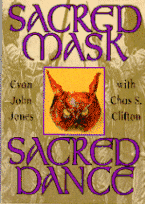
This is an exerpt from Chapter 9 of Sacred Mask, Sacred Dance by Evan John Jones with Chas S. Clifton, published in 1997 by Llewellyn Publications. (Copyright 1996 by Evan John Jones. All rights reserved.)
For more on Cochrane's influence on American witchcraft, click here.

The "Masked Rites of Tubal Cain" derive from the coven headed by Robert Cochrane, a leading figure in the British Craft revival of the 1960s. In her book The Rebirth of Witchcraft, Doreen Valiente gives us a fair and accurate picture of Robert Cochrane the man, including his faults. Like the rest of us, he certainly had some. But Valiente does not delve deeply into Cochrane the magician even though she makes the valid point that many of his rituals were more "shamanistic" than, for want of a better word, "formal" magic.
Many of Cochrane's ideas were innovative yet seemingly based on historically proven fact. On the other hand, Cochrane did supply author Justine Glass with the totally spurious "1724" story, based on the numbers engraved on a copper plate that Doreen Valiente bought for him, which he then claimed had been handed down through his family for well over a hundred years. Glass's book, Witchcraft the Sixth Sense--and Us, gave this story credence. When it became public knowledge, no one knew what to make of this man--and of what he claimed to be the traditional Craft. Yet they were still intrigued by Cochrane's "old tradition," which was so different from the better-known Gardnerian Craft.
Ever since Cochrane's death in 1966, many people have asked, "What would have happened had he lived longer?" meaning, of course, how much influence would he have had in shaping the future of Witchcraft? No one really knows, but, strangely enough, Cochrane partially answered that question in a letter to the late William G. Gray, the famous occult author and founder of the Sangreal rites. In it, Cochrane writes, "I keep on getting the feeling that we are preparing the ground for a crop that we will not reap, waiting for a dawn that may never come, but wait we must. We are the force for something else that is to occur, the creators of opinion for a new concept that is arising in this world."
As this excerpt shows, Cochrane never really expected to become the leader of a vast network of covens-within-the-clan, nor did he expect that what he believed in and taught as the Craft would reach others beyond his immediate coven. More than once he told me that if his teaching would reach further, it would have to be because of others rather than himself. My collaboration with Doreen Valiente, which produced Witchcraft: A Tradition Renewed, made a start by presenting the basic coven structures, tools, and rites. This book now brings the process a stage further, for Cochrane himself never took the shamanistic rites this far but worked them on a more or less ad hoc basis. I have taken his basic ideas and extended them to their present form because that is what logic dictated.
Apart from what he taught me, the only hard evidence concerning his works are letters. Perhaps the most revealing of all are those written to William G. Gray, whom he very much admired. Just before he died, Bill Gray passed them over to me to work on, which means that I am able to take ideas and concepts from them and enlarge on these while showing how they all interlock to give an overall picture of what Cochrane called his "traditional mysteries."
Before going on, let us consider the question posed by the title
of this chapter. Was Cochrane a real magician of the old tradition, or was he
just another magical trickster, a "tregetour" or mountebank who jumped on the
occult bandwagon, as some people who never even met the man now claim that he
did? Perhaps what is written here will go some way to help people to make up
their own minds about him and not prejudge or blindly accept everything claimed
for both him and his works. After all, even during his lifetime his harshest
critics often were those of us who had worked with him! But even then we still
had the feeling that what he did was very different from the usual run of occult
workings. So what was so special about the way he worked all those years ago?
Back to Chas S. Clifton's Online Writings home page.